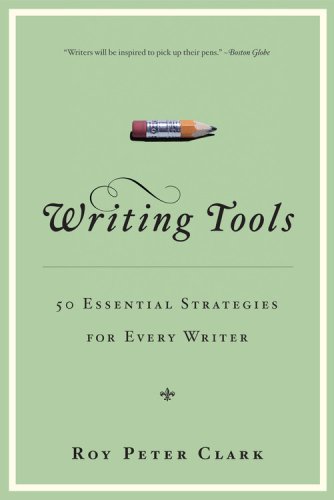 Roy Peter Clark, the author of Writing Tools: 50 Essential Strategies for Every Writer, is a good writer. How else can make you a book on writing so enjoyable? Here are some gems, with a few of my comments along the way.
Roy Peter Clark, the author of Writing Tools: 50 Essential Strategies for Every Writer, is a good writer. How else can make you a book on writing so enjoyable? Here are some gems, with a few of my comments along the way.
• Avoid verb qualifiers like “sort of,” “seemed to,” and “must have” (21). It seems to me I tend to do this sometimes.
• Use adverbs to change the meaning of the verb, not to intensify it. “Killing me softly” is good because killing is not supposed to be soft. “Killing me fiercely” is redundant. Bad adverb (27).
• “When writers fall in love with their words, it is a good feeling that can lead to a bad effect.” Murder your darlings (50).
• Don’t explain complicated ideas with complicated sentences. The harder the concept, the shorter the sentences should be (60).
• Readers have a larger vocabulary than writers. Make obscure words clear by the context. But don’t be afraid to use new words (69).
• Don’t use familiar metaphors. Don’t say “white as snow” when you can say “white as the Queen of England” (81).
• Vary the lengths of your sentences (90). “Jesus wept” is powerful because it is short. But every sentence can’t be short. Then things get boring. Every sentence sounds the same. Nothing will stand out. There is no variation. Everyone will get bored. See what I mean?
• Vary the lengths of your paragraphs (93). Readers can survive a long paragraph, so long as there aren’t too many. Short paragraphs can pack a punch. But don’t overdo it.
Even if you think it is dramatic.
Very dramatic.
And fills up
lots
of
space.
That’s not deep. It’s annoying.
• “If a writer wants the reader to think something the absolute truth, the writer should render it in the shortest sentence possible” (99).
• The more serious your subject, the more you can back off and play it straight. The more inconsequential the topic, the more the writer can show off (103).
• Avoid, at all costs, jargon and bureaucrat-speak, like in this real example from an elementary school mission statement: “Our mission is to improve student achievement and thereby prepare students for continued learning in middle school and high school. This learning community will accomplish this mission by developing and implementing world class learning systems. Alignment will be monitored by continual application of quality principles and responsiveness to customer expectations” (109). Barf.
• Dialogue advances narrative; quotes delay it (128). Christian books have too many block quotes (including a couple of my sections in Why We’re Not Emergent). Most readers skip long block quotes. Good writers leave out the stuff readers skip.
• Repetition works, but only if you intend it (159). If you don’t mean to use repetition as a stylistic device, it just gets in the way. You end up repeating yourself over and over. That’s bad repetition, the kind that is unintentional but keeps filling up space. Like this paragraph.
• Limit self-criticism in early drafts. Turn it loose during revision (232). You will never be a good writer unless you are willing to notice your bad writing.


















